Archive for August, 2010
Dogs and bones
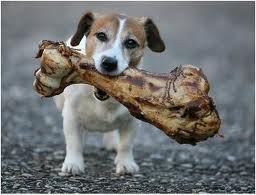 Your dog’s love for bones can be traced back to their wild predatory instincts. You think that you are doing your dog a favor when you’re in the supermarket and ask the man at the meat counter for a nice juicy bone for your dog. Remember, just as milk is always not good for cats, bones aren’t always good for dogs. Small bones such as pork chops or chicken wings can fracture and get lodged in your dog’s throat. Large bones such are leg bones are better because a dog can’t swallow them. Even these bigger bones are not that great for your dog since they can be hard and fracture his teeth. The best policy is to ban bones entirely. Try giving your dog a biscuit or a dental chew toy instead.
Your dog’s love for bones can be traced back to their wild predatory instincts. You think that you are doing your dog a favor when you’re in the supermarket and ask the man at the meat counter for a nice juicy bone for your dog. Remember, just as milk is always not good for cats, bones aren’t always good for dogs. Small bones such as pork chops or chicken wings can fracture and get lodged in your dog’s throat. Large bones such are leg bones are better because a dog can’t swallow them. Even these bigger bones are not that great for your dog since they can be hard and fracture his teeth. The best policy is to ban bones entirely. Try giving your dog a biscuit or a dental chew toy instead.
Canine Cushing’s Disease
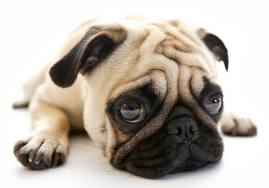 As your pet ages, watch for any changes in his health. If you dog is middle aged or older and has a pot belly, it may not be because you give him too many dog treats. It may be that he has Cushing’s disease. This is a hormonal imbalance that occurs when a dogs adrenal glands begin secreting too much cortisol. It’s a common condition among Poodles, Boston Terriers, Dacshunds and Boxers. Symptoms of Cushing’s Disease include, lethargy, excessive thirst and urination, and a pot belly. Uniform hair loss on both sides of the body,vomiting and diarrhea may also occur. If your older dog develops any of these symptoms, talk to your veterinarian. Treatment for Cushing’s Disease varies but it is most effective if it’s started early.
As your pet ages, watch for any changes in his health. If you dog is middle aged or older and has a pot belly, it may not be because you give him too many dog treats. It may be that he has Cushing’s disease. This is a hormonal imbalance that occurs when a dogs adrenal glands begin secreting too much cortisol. It’s a common condition among Poodles, Boston Terriers, Dacshunds and Boxers. Symptoms of Cushing’s Disease include, lethargy, excessive thirst and urination, and a pot belly. Uniform hair loss on both sides of the body,vomiting and diarrhea may also occur. If your older dog develops any of these symptoms, talk to your veterinarian. Treatment for Cushing’s Disease varies but it is most effective if it’s started early.
Giving your cat a pill
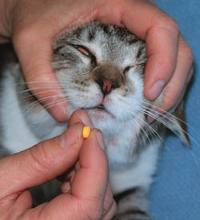 Does your cat squirm, whine and run away from you when you want to give him a pill? It is tough to do but there are some tricks that will help. Before you get started, gently wrap your cat in a towel to protect you from his claws. Put your fingers on both sides of his cheeks and then tilt is head way back. Remember, you have gravity working for you. Gently press against your cats lips to make him drop his jaw. When he opens up, quickly pop the pill as far back in his throat as possible. Hold his mouth shut and stroke his throat to get him to swallow. The key is to tilt his head all the way back so the pill drops right in. Pet medication and pills for cats could be difficult to administer. If you have trouble, ask your vet for a demonstration.
Does your cat squirm, whine and run away from you when you want to give him a pill? It is tough to do but there are some tricks that will help. Before you get started, gently wrap your cat in a towel to protect you from his claws. Put your fingers on both sides of his cheeks and then tilt is head way back. Remember, you have gravity working for you. Gently press against your cats lips to make him drop his jaw. When he opens up, quickly pop the pill as far back in his throat as possible. Hold his mouth shut and stroke his throat to get him to swallow. The key is to tilt his head all the way back so the pill drops right in. Pet medication and pills for cats could be difficult to administer. If you have trouble, ask your vet for a demonstration.
Cats and milk
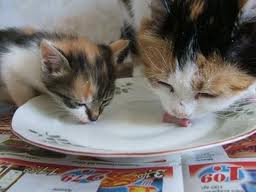 The classic image of a cat is with a bowl of milk. You are not doing you cat a favor by feeding her dairy products. Some cats can tolerate a little pasturized milk as an occasional treat but as your cat ages, she will likely become lactose intolerant and find it difficult to digest the sugar in milk. Many cats, especially adults get diarrhea after drinking dairy. Even if you give your cat a little milk once in awhile and she’s seem fine, it’s never a good idea to make milk a part of your cat’s diet. It is okay to occasionally indulge your cat but stay alert and look for any changes in her stool. Remember regardless of what you give her as a cat treat, plain water is what she really needs. Make sure that there is a bowl filled with water available at all times.
The classic image of a cat is with a bowl of milk. You are not doing you cat a favor by feeding her dairy products. Some cats can tolerate a little pasturized milk as an occasional treat but as your cat ages, she will likely become lactose intolerant and find it difficult to digest the sugar in milk. Many cats, especially adults get diarrhea after drinking dairy. Even if you give your cat a little milk once in awhile and she’s seem fine, it’s never a good idea to make milk a part of your cat’s diet. It is okay to occasionally indulge your cat but stay alert and look for any changes in her stool. Remember regardless of what you give her as a cat treat, plain water is what she really needs. Make sure that there is a bowl filled with water available at all times.
Dogs and hypothermia
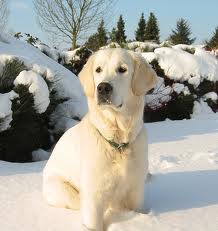 We’ve spoken about how heat affects your dog. Today, even though we are still in the middle of Summer in the U’.S., we’re gonna talk about how the cold affects your dog. A dog with hypothermia is a very cold animal who’s losing body heat faster than he could generate more. He’ll start to shiver to warm up and every hair will stand on end to trap heat. If his body heat falls below 100.5 Fahrenheit, hypothermia can set it. In mild cases, your dog will seem sluggish and slow. Get him indoors and into a nice warm room and cozy dog bed and wrap him in a warm blanket. Let him warm up slowly. If he seems so sluggish that he is near collapse, rush him to the nearest clinic for treatment. Even if your dog gets better, have him checked by your veterinarian. Hypothermia can cause permanent damage.
We’ve spoken about how heat affects your dog. Today, even though we are still in the middle of Summer in the U’.S., we’re gonna talk about how the cold affects your dog. A dog with hypothermia is a very cold animal who’s losing body heat faster than he could generate more. He’ll start to shiver to warm up and every hair will stand on end to trap heat. If his body heat falls below 100.5 Fahrenheit, hypothermia can set it. In mild cases, your dog will seem sluggish and slow. Get him indoors and into a nice warm room and cozy dog bed and wrap him in a warm blanket. Let him warm up slowly. If he seems so sluggish that he is near collapse, rush him to the nearest clinic for treatment. Even if your dog gets better, have him checked by your veterinarian. Hypothermia can cause permanent damage.
What is the world’s largest dog?
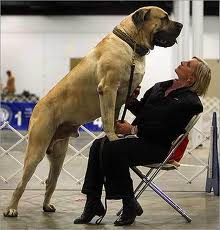 There are several dogs known as the worlds largest dog. According to the Guinness Book of World Records, one of the largest dogs is Hercules, a massive English Mastiff. He was entered in the Guinness Book of World Records in 2001. The dog weighed 280 pounds with paws the size of softballs and a 38 inch neck. He’s owned by J. Flynn of Peabody, Massachusetts. His owner says that he is extremely gentle and wouldn’t hurt anyone.
There are several dogs known as the worlds largest dog. According to the Guinness Book of World Records, one of the largest dogs is Hercules, a massive English Mastiff. He was entered in the Guinness Book of World Records in 2001. The dog weighed 280 pounds with paws the size of softballs and a 38 inch neck. He’s owned by J. Flynn of Peabody, Massachusetts. His owner says that he is extremely gentle and wouldn’t hurt anyone.
A born guard dog, English Mastiff’s rarely bark. They love to please and need a lot of human leadership. They need to be socialized well when they’re young so they don’t become aloof with strangers. The Mastiff tends to drool, wheeze and snore loudly. They can also be somewhat difficult to train. The objective in training this dog is to try to achieve a pack leader status.
Mastiffs tend to be lazy that’s why it’s important that they get regular exercise. Make sure that you get a very strong dog leash as these dogs are extremely heavy. Life expectancy is between 10 and 12 years.
Dogs drooling to stay cool
 In hot summer days like this, your dog cannot sweat to keep from overheating. When his temperature rises, he pants and drools to keep himself cool. This forces air over his naval cavity and over his wet tongue. As the air circulates, moisture evaporates taking some of the dogs body heat with it. When your dog exercises in the hot weather, he may pant for what seems like a long time, a half hour or longer is not unusual. You should always keep an eye on your dog to make sure that he is not in distress. Symptoms of heatstroke include accelerated and abnormal breathing and heart rate, a dry mouth and heavy drooling. If you notice any of these signs, do not try to give him any pet medication, call your veterinarian right away.
In hot summer days like this, your dog cannot sweat to keep from overheating. When his temperature rises, he pants and drools to keep himself cool. This forces air over his naval cavity and over his wet tongue. As the air circulates, moisture evaporates taking some of the dogs body heat with it. When your dog exercises in the hot weather, he may pant for what seems like a long time, a half hour or longer is not unusual. You should always keep an eye on your dog to make sure that he is not in distress. Symptoms of heatstroke include accelerated and abnormal breathing and heart rate, a dry mouth and heavy drooling. If you notice any of these signs, do not try to give him any pet medication, call your veterinarian right away.
Dental care for your dog
 Brushing your dogs teeth does more than just whiten them. Healthy bodies and healthy teeth are linked. The same bacteria that causes stinky dog breath could also lead to gingivitis and periodontal disease and may increase your dog’s risk of heart, liver and kidney problems. So by providing your dog with good dental care, you could also improve his overall health. Unfortunately, most dogs don’t get the dental care they should. Many end up needing a costly, professional tooth cleaning. To minimize such bills and to minimize your dog’s risk of developing disease, brush his teeth regularly and give him plenty of dental toys to promote chewing. Dry food and dental treats may also be helpful.
Brushing your dogs teeth does more than just whiten them. Healthy bodies and healthy teeth are linked. The same bacteria that causes stinky dog breath could also lead to gingivitis and periodontal disease and may increase your dog’s risk of heart, liver and kidney problems. So by providing your dog with good dental care, you could also improve his overall health. Unfortunately, most dogs don’t get the dental care they should. Many end up needing a costly, professional tooth cleaning. To minimize such bills and to minimize your dog’s risk of developing disease, brush his teeth regularly and give him plenty of dental toys to promote chewing. Dry food and dental treats may also be helpful.